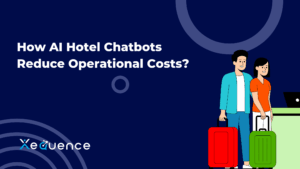- Home
- Artificial Intelligence
- Future of Conversational Chatbot
Future of Conversational Chatbot
- January 17, 2023
- XequenceAI
- Artificial Intelligence, Chatbot, Technology

Conversational Chatbot Is Beneficial In A Number Of Ways
An AI chatbot is a computer program that simulates human conversation through natural language processing. It can be integrated into various platforms such as websites, messaging apps, and mobile apps. AI chatbots are designed to understand and respond to user input in a human-like manner, and can perform a variety of tasks such as answering frequently asked questions, providing customer service, and making recommendations. The future of conversational chatbots looks promising as the technology continues to evolve and improve.
Here are a few ways in which chatbots are likely to change and improve in the future:

Increased natural language understanding:
Chatbots will continue to improve their understanding of human language and be able to handle more complex and nuanced inputs. This will enable them to better understand context and meaning, allowing them to respond more accurately and effectively to a wider range of questions and requests.
More advanced machine learning:
As machine learning techniques continue to advance, chatbots will be able to learn from a greater variety of data and improve their performance over time. This will enable them to handle more complex tasks and provide more accurate and relevant responses to users.
Greater personalization:
With the increasing amount of data available on users, chatbots will be able to provide more personalized experiences. This could include things like recommending products or services based on a user’s browsing history or providing information that’s tailored to a user’s specific interests or needs.
More human-like interaction:
Chatbots will increasingly become more natural and human-like in their interactions. This can include things like using more natural language, understanding and responding to nonverbal cues, and even using facial expressions, tone of voice, and other elements of human communication.
Integration with other technologies
Chatbots will continue to integrate with other technologies such as the Internet of Things, virtual reality, and augmented reality, opening new possibilities for how they can be used and what they can do.
By 2023, chatbots will help the retail, banking, and healthcare sectors save $11 billion on customer support questions alone, with over 2.5 billion hours saved, predicts Juniper Research. Out of these industries, the retail sector will be able to deploy chatbots 70% more effectively to help with consumer enquiries.
In addition to assisting with customer interactions on company websites, chatbot adoption will increase within brand apps, accounting for 50% of all chatbot usage. Fortunately, it appears that chatbots will continue to exist for some time to come.The way businesses engage with and comprehend their customers is changing thanks to chatbots.
Chatbots will be able to provide a more individualized client experience with the help of AI. Through customer service, internal procedures, and marketing initiatives, it also helps businesses save money. Chatbot integration across a company’s website, app, and social media platforms has a lot of possibilities.
Overall, chatbots are becoming more advanced and versatile, with the potential to provide a wide range of benefits to businesses and consumers alike, but it also still have room for improvement, especially on being more human-like in communication. There are chances for others to start utilizing chatbot in their respective industries, as the e-commerce, travel, and hotel industries are currently doing.
Recent Posts
Newsletter
Get regular updates on data science, artificial intelligence, machine
You may also like

AI Travel Assistants: The New Personal Travel Planners

5 Things an AI Travel Assistant Can Do in Seconds

How AI Hotel Chatbots Reduce Operational Costs?




